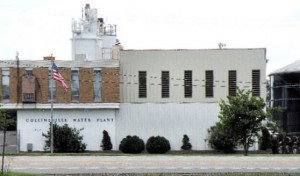The television camera was set up, pointing towards the speaker’s podium, with the City Council members and the mayor in the background, waiting for sparks to fly at the special meeting called to discuss the rising water costs for Collinsville water customers. After spirited social media discussions and blaring headlines about the 38 percent rate increase, many expected a rancorous citizen gallery shouting at the City Council members for agreeing to build a new water treatment plant, precipitating the rate increase, without getting more citizen input first.
But then the unexpected happened, a calm meeting, complete with the exchange of information and civil conversation broke out. City staffers explained the decision to build a new plant instead of rehabilitating the existing plant that went online in 1958. Citizens asked questions about their water bills, their sewer bills – and even the trash pickup in their condominium complex – and were provided answers. The television camera was long gone by the time the civilized discussion ended.
Some in the audience speculated that the lack of chastisement of the city by residents could have been because many in the community believed the decision to increase their water rates by an average of about $5 per month was already made and could not be changed. Others, like Joe Ashmann, said the format of the meeting, in which the city presented information and then allowed the citizens to ask questions, led to civilized discussion. Ashmann and Councilwoman Karen Woolard spoke later of the value provided by the city staff, City Council and mayor answering questions posed to them by the citizens who spoke during the meeting.
New versus rehabilitation versus buying from a supplier
City Council members and city staffers explained the long-term cost benefits of their decision to build a new plant. Much of the information is contained in a previous story.
The estimated water rate increase if the council had chosen to rehabilitate the existing structure was $1.10 per 1,000 gallons. The chosen option caused an increase of $1.27 per 1,000 gallons for 2014. Director of Water/Wastewater Dennis Kress said the average Collinsville household uses about 4,100 gallons per month.
The new plant is expected to be constructed in about the half the time it would have taken to rehabilitate the existing structure. The new plant will also nearly double the city’s water capacity, allowing the city a more robust response to emergency situations. The new plant will also save the residents money in its lifetime due to operational efficiencies realized by enhanced technology, Kress said.
Surrounding cities that purchase their water from an outside supplier have higher rates than Collinsville water customers, according to research performed by Finance Director Tamara Ammann and presented at a special meeting of the City Council on Sept. 23. “I was surprised at how low our rates are and how low our rates will continue to be after the raise in order to do the plant,” Woolard said Monday. “I think that’s an important thing for the public to know is that we’ve been really, really low currently and that we’re still going to be, if you want to use the word competitive, to the communities around us.”
A tour of the existing plant and an understanding that the city has water reserves that will last only 30 hours in the case of an emergency helped convince Woolard to make a tough choice, she said.
“Anyone who knows me knows that this was a really, really hard decision for me because I really don’t want to borrow money,” Woolard said. “I realized that the condition of the plant put our homebound and our young families at risk. We have a responsibility to our citizens.”
How to pay for the new plant
Collinsville Resident Phil Astrauskas suggested using tax increment finance funds to offset the cost of the new water plant. Woolard explained that the project is not eligible for TIF funds because the plant is not in a TIF district. Mayor John Miller cited examples of sewer and water projects in TIF districts, including the water main replacement on Clay Street, that are funded by TIF. City Manager Scott Williams estimated that 85-90 percent of all TIF money spent by the city goes towards infrastructure projects.
In response to a question Councilwoman Nancy Moss said she had received prior to the meeting, Ammann said the balance the city maintains in the Enterprise fund is not sufficient to cover the $15.6 million cost of construction and should be reserved for emergency situations. When it was suggested that the balance was too large, Ammann explained that maintaining a balance that is 15-20 percent of expenses can save the city money when they issue bonds in the form of lower interest rates.
Fund balances are considered when a city’s financial viability is determined by bond rating agencies. In May, Moody’s assigned the city a Aa3 bond rating for having “a stable financial position supported by the revenue raising flexibility afforded by home-rule status and solid reserves; and a manageable debt burden with ongoing discussions regarding potential future payment options for non-general obligation securities.”
A question was posed on social media, Miller said, about the use of property taxes for the plant. Ammann said the city uses property tax money to pay for items like police and fire services. Services provided that are more easily tied to individual use, such as water consumption, are charged to the consumers directly. Ammann also reminded the City Council, and those in attendance, that the city has not been responsible for a property tax increase in seven years.
The School Board recently requested an increased levy likely to result in a property tax increase (see related story). The Collinsville Township trustees are voting at 7 p.m. Tuesday to finalize an increased levy that will likely increase property taxes.
Quality of Collinsville water
Collinsville resident David Kahn asked if the new plant would resolve the issue that some residents experience in which their copper water pipes turn green. Kress explained that the situation is not unique to Collinsville and the cause is a mystery to everyone who has studied the issue.
Kress said the issue is prevalent on the East Coast. Communities around Collinsville have also contacted him regarding the issue. The city attempted to solve the mystery in the 1990’s, sending samples to four labs and sending tubing for examination, but to no avail.
Communities whose primary water source is open air water, such as rivers or lakes, do not experience the issue, Kress said. Wells serve as Collinsville’s water source.
Despite the green pipes, Collinsville has not had a water compliance issue with the Illinois EPA in “over a decade,” Kress said. Samples of Collinsville water are collected at various points in the distribution system 30 times per month and sent to independent labs for testing. The results are sent to the Illinois EPA.
The process for treating the water will not substantially change with the new plant, Kress said.
The user fee explained
Don Koonce stepped to the podium near the end of the 75-minute session to announce that he had no issue with the new water plant, but he wanted to understand why he is assessed a user fee on each bill. “I have a problem with the user fee,” Koonce said. “I’m paying for my water, I’m paying for my sewer, I’m paying for trash pickup, but then you also charge me $14 every two months for what?
The fee, Kress explained, is for servicing the meters in each residence and business. The rate for the smallest meter is $7 per month and the largest is about $200 per month.




